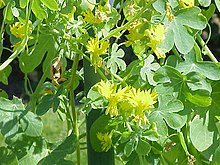
Summary
Tropaeolum peregrinum, the canary-creeper,[1]canarybird flower, canarybird vine, or canary nasturtium, is a species of Tropaeolum native to western South America in Peru and possibly also Ecuador.[2][3]
| Tropaeolum peregrinum | |
|---|---|

| |
| Scientific classification | |
| Kingdom: | Plantae |
| Clade: | Tracheophytes |
| Clade: | Angiosperms |
| Clade: | Eudicots |
| Clade: | Rosids |
| Order: | Brassicales |
| Family: | Tropaeolaceae |
| Genus: | Tropaeolum |
| Species: | T. peregrinum
|
| Binomial name | |
| Tropaeolum peregrinum | |
Description edit
It is a climbing plant growing to 2.5 m high by scrambling over other vegetation. The leaves are 2–5 cm diameter, palmately lobed with three to seven (mostly five) lobes; they are subpeltate, with the petiole attached within the leaf (not at the edge), though near the edge.
The flowers are 2–4 cm diameter, with five frilled petals, bright pale yellow (canary-coloured, hence the English name), often with red spots at the base of the petals, eight stamens, and a 12 mm nectar spur at the rear.[3]
Cultivation edit
It is a frost-tender perennial widely grown as an annual[4] ornamental plant in cool temperate parts of the world.
References edit
- ^ BSBI List 2007 (xls). Botanical Society of Britain and Ireland. Archived from the original (xls) on 2015-06-26. Retrieved 2014-10-17.
- ^ "Tropaeolum peregrinum". Germplasm Resources Information Network. Agricultural Research Service, United States Department of Agriculture. Retrieved 21 January 2018.
- ^ a b Huxley, A., ed. (1992). New RHS Dictionary of Gardening. Macmillan ISBN 0-333-47494-5.
- ^ "Tropaeolum peregrinum". Royal Horticultural Society. 2021. Retrieved 28 February 2021.


